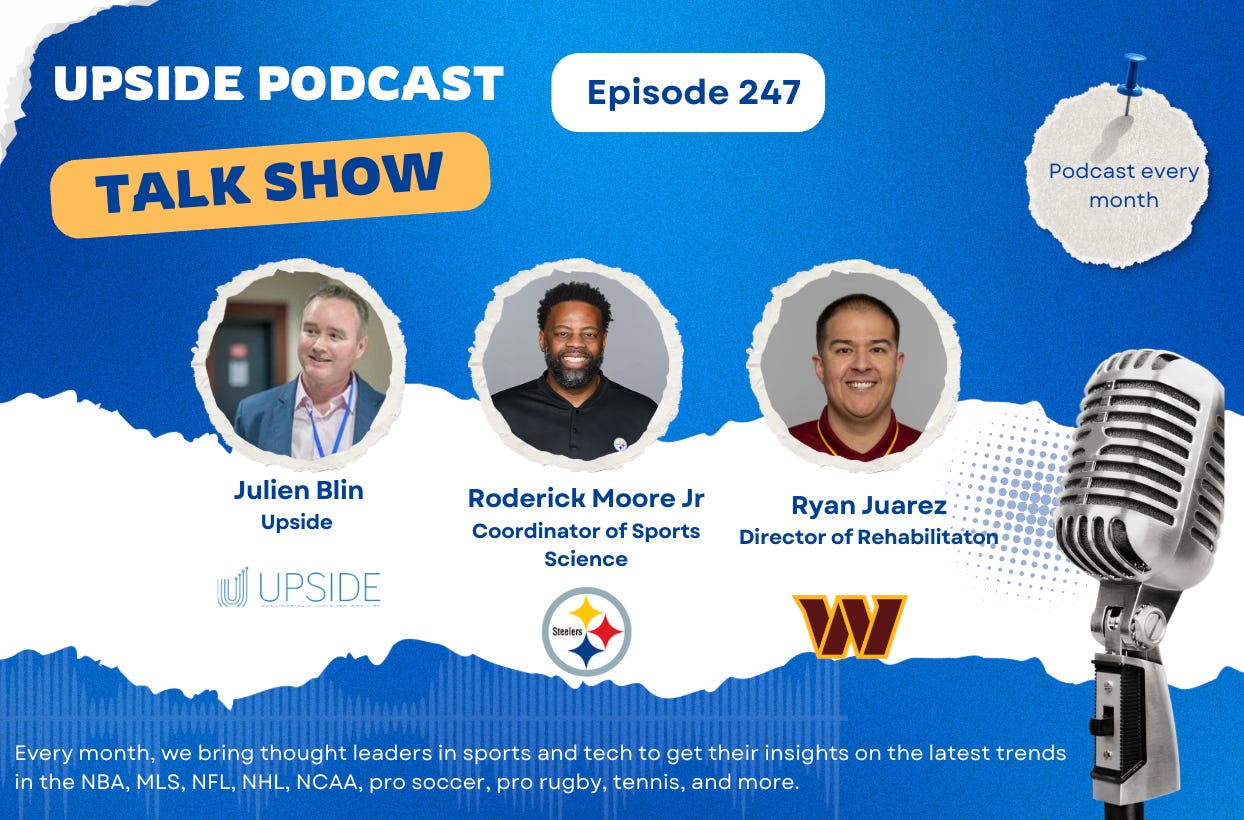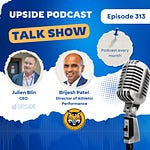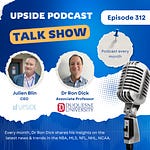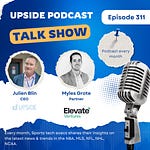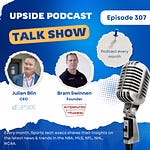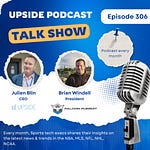This week we have the honor to interview a group of NFL Top practitioners to talk about the latest trends in the world of sports performance in the NFL.
Ryan Juarez, Director of rehabilitation, Washington Commanders (NFL team).
Roderick Moore Jr, coordinator of sports science, Pittsburgh Steelers (NFL team).
📝Show Notes: Through this interview, we touched on the following topics:
What major shifts they have seen in how NFL teams approach in-season recovery and load management, especially with the extended regular season and increased game speed.
How NFL teams are using data and wearables not just for performance metrics, but to make real-time decisions during adversity — like mid-season slumps, key injuries, or losing streaks.
What the best coaching or cultural practices they have seen that actually help players stay mentally sharp and connected through the grind of a long NFL season.
On what is often misunderstood about what it really takes to last in the NFL in terms of recovery habits, mindset, and adaptability, for young players entering the league.
On a specific moment — either with a team or an athlete — where a setback or injury led to a breakthrough in how you approach training or recovery.
You can read the full transcript of the podcast interview located at the top of this blog post.
Here are some of the best quotes of our conversation with Ryan and Roderick:
Q1. Major shifts in in-season recovery and load management
Roderick Moore Jr.:
“With the regular season now extended and the new international games, the challenge has shifted. For example, when I was in Atlanta, we went to London in 2021 and 2023, and now in 2025, they’re going to Germany. This year with the Steelers, we’re headed to Ireland — our first international trip in a while. So it’s no longer just about recovery from weekly games, but dealing with global travel logistics. Do you leave Monday? Thursday? Most teams leave Thursday, but then you have to manage sleep on the plane, acclimation to time zones, food logistics, and even what kind of pillows or sleep kits you use. You have to prepare months in advance — sometimes starting in June — just to get nutrition and gear shipped in time. All of that impacts load management and performance. It’s not just ‘one more game’ — it’s a cascade of adjustments that can make or break a season.”
Ryan Juarez:
“We’ve really leaned into the recovery side by building infrastructure — we now have a dedicated recovery room staffed by athletic trainers. We’ve added a cryo chamber, infrared sauna, and soon we’re getting a four-person hyperbaric chamber. But what’s most interesting is how we replicate that when traveling. Last year we had a week-long road trip — from Cincinnati to Phoenix — and we worked with mobile companies to deliver hot tubs and cold tubs in each location. That kind of logistics work wasn’t even on the radar a few years ago. Now, everything’s about maximizing that 1% edge — and fitting all these moving pieces into a cohesive workflow.”
Q2. Data and wearables for real-time decision-making during adversity
Roderick Moore Jr.:
“In tough stretches — say during a losing streak or coming out of a rough game — we use GPS and internal load data to reevaluate everything. You track live data in practice and compare it to camp, Week 1, or the bye week. It might tell you, 'Hey, we’re not working hard enough,' or conversely, 'We’re overreaching.' You need that insight to decide whether to back off or push harder. But the data only helps if you’ve built a culture of transparency and trust with both players and coaches. Because even the best data means nothing if you don’t have coach buy-in — or the athletes don’t feel heard. That balance of instinct and evidence is where progress happens.”
Ryan Juarez:
“Wearables and GPS tech have opened up important conversations. If a guy comes in and says, ‘Hey, my hamstring’s a little tight,’ and the GPS shows he’s a step slower in practice — that’s your trigger. You don’t just treat symptoms anymore — you now have the data to validate or even preempt injuries. We had a couple instances last season where a dip in player metrics helped us catch things before they escalated. That ability to intervene early — that’s a game changer.”
Q3. Best coaching or cultural practices for staying mentally sharp
Ryan Juarez:
“By the time we hit the bye week last year — which was really late — everyone was just exhausted. It was like hitting a wall. That week gave us a chance to reset, and we came out stronger. That experience really emphasized the need for communication. Our staff, our performance team — we all talked with the players, adapted based on their feedback. You can have all the tools in the world, but if your players aren’t bought in mentally, the grind will wear them down. Keeping everyone aligned — physically and emotionally — makes the difference late in the season.”
Roderick Moore Jr.:
“In the NFL, especially with the Steelers, we rely on tools like Teamworks for communication, but the culture starts with leadership. Coach Tomlin always says, ‘I don’t care where an idea comes from as long as it helps the team.’ That creates room for input — from interns to veterans. If players need more sleep, we start the day later. If a week’s been brutal, we modify the schedule. Flexibility isn’t weakness — it’s survival. Especially this year — with our early bye after Ireland — we’re already planning ‘mini-byes’ to keep guys mentally and physically sharp.”
Q4. Misunderstandings young players have about lasting in the NFL
Roderick Moore Jr.:
“The biggest misconception I see in rookies is around routines. They think they have one — but they don’t. A real routine is intentional, consistent, and adaptable. Veterans will tell you — it’s not just what you do on game day. It’s how you recover, how you use your off-day, how you prepare your mind. Some guys spend Tuesdays with family for sanity. Others use it for film, lifts, or recovery work. The guys who last? They find a system and stick to it. And for rookies without big contracts yet, that means taking full advantage of in-house resources — cryo, massage, recovery tech — before they can afford anything outside.”
Ryan Juarez:
“When rookies come in, they look nervous — they don’t know where to go or what to do. Our job is to make them feel supported, but also help them build that recovery mindset. A lot of what we do is just guidance — like saying, ‘Watch how this vet does it.’ And that’s true in any profession, right? Learn from the people who’ve been there, who’ve made it. If they model good habits, those habits become part of the rookie’s DNA.”
Q5. Setback or injury that led to a breakthrough
Ryan Juarez:
“One that sticks out is hamstrings. Early in my career, I didn’t emphasize eccentric loading or full-speed sprinting enough before return-to-play. There was one case where a GPS showed an athlete at 88% — I let it slide. Then boom — game time injury. That taught me that 90%+ speed exposure in practice isn’t just a number — it’s insurance. Now I’m way more aggressive about hitting that threshold before clearing a guy.”
Roderick Moore Jr.:
“In Atlanta, I had an athlete who hadn’t hit his 90% speed in over a month. We kept encouraging him, but he kept saying he was fine. Then he pulls up with a soft tissue injury. After that, it clicked for him. Now — and I see this here too — we have guys who ask to hit their sprint thresholds. They’ll say, ‘Coach, don’t let me slide — keep me honest.’ Some even hit new top speeds in-season. That shift in accountability — from us to them — that’s when you know the culture’s working.”
You may also like:


